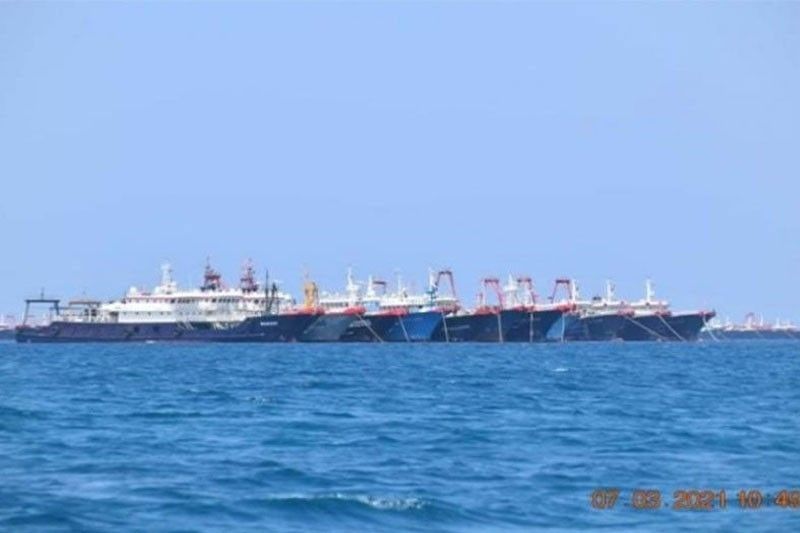Diplomatic protests still effective vs China – experts

MANILA, Philippines — The successive filing of diplomatic protests against China over its aggressive acts and encroachment in the West Philippine Sea is not something to be belittled by critics and claimant countries as such efforts actually have a deterrent effect and can help strengthen the Philippines’ rights over the waters in the long term, experts told a Senate inquiry yesterday.
The Senate committee on foreign relations, chaired by Sen. Aquilino Pimentel III, held a hearing on a bill seeking to establish the country’s maritime zones following a hostile incident last Nov. 16 where Chinese coast guard ships blocked and water cannoned Filipino boats delivering supplies to troops stationed at Ayungin Shoal in the West Philippine Sea.
Sen. Panfilo Lacson, who chairs the committee on national defense and security, asked resource persons consulted on the bill on the diplomatic protests or notes verbale filed by the Philippines against China since the 2016 arbitral ruling that dismissed Beijing’s nine-dash line claim over the South China Sea was handed down.
Foreign Affairs Deputy Assistant Secretary Myca Fischer told the committee that some 241 diplomatic protests have been filed since 2016, of which 152 drew responses from China.
Fischer said these include the 183 “daily protests” filed by Foreign Affairs Secretary Teodoro Locsin Jr. to oppose the presence of Chinese vessels, particularly around Pag-asa Island and Julian Felipe Reef.
Lacson noted there were criticisms that the diplomatic protests were useless or just for “future reference” for some legal battle.
Fischer said the filing of protests is part of “political and legal warfare” as the country “needs to be a persistent objector.”
“Perhaps in the future we may consider future actions and then we cannot be accused of estoppel, so that is why we continue to express our protest to the incursions,” she said.
Ambassador Gilberto Asuque said one of the reasons the Philippines won the 2016 case against China was its consistently filing diplomatic protests since 1995 when Beijing put up what it claimed was a fishermen’s shelter in Panganiban (Mischief) Reef that eventually became a military installation.
“The important effect is really to counter China… that they have no right to be in the West Philippine Sea,” Asuque said.
Jay Batongbacal of the University of the Philippines Institute for Maritime Affairs and the Law of the Sea said such protests help “neutralize careless and reckless statements of top government officials on the issue at some midnight press conference,” apparently referring to President Duterte.
Foreign Affairs Deputy Assistant Secretary Emmanuel Fernandez said such protests have “present utility.”
“Can you imagine we do not make such protests? Can you imagine what else China would be doing if we don’t? These put a spotlight on what China is doing, every time it does something wrong and alert the global community on what China is doing violation of rule of law,” Fernandez said.
Rommel Banlaoi of the Center for Intelligence and National Security Studies said there is a strategic importance in filing diplomatic protests as this would strengthen documentary evidence of the country’s claim.
It is also a sign that the Philippines regards the problem as a diplomatic issue that can be resolved diplomatically, he said.
Meanwhile, the House of Representatives voted 189-0 to approve on third and final reading yesterday a measure that provides the archipelagic delineation of the Philippines’ maritime zones or jurisdiction.
Rep. Ann Hofer, chair of the committee on foreign affairs, said the approval of House Bill 9981 is an “important step towards completing the Philippines’ archipelagic house and strengthening the country’s sovereign rights over its maritime territories.”
HB 9981, of which Hofer is a principal author, is entitled “Philippine Maritime Zones Act.”
The Zamboanga-Sibugay congresswoman said the approval of the measure was the “result of years-long consultation, engagement and legislative work.”
Rep. Cyrille Abueg-Zaldivar said the measure aims to promote territorial integrity and improve maritime governance and law enforcement.
The measure defines maritime zones of the Philippines as those that comprise the internal waters, archipelagic waters, territorial sea, contiguous zone, exclusive economic zone (EEZ) and continental shelf.
The bill sets the maximum extent of territorial sea at 12 nautical miles, contiguous zone (24 nautical miles), EEZ (200 nautical miles) and continental shelf (200 nautical miles). – Delon Porcalla
- Latest
- Trending



























